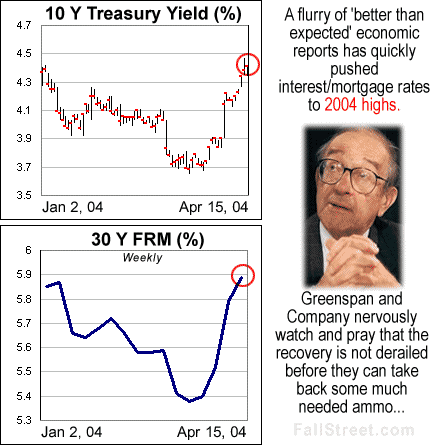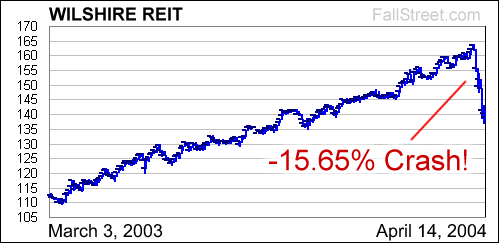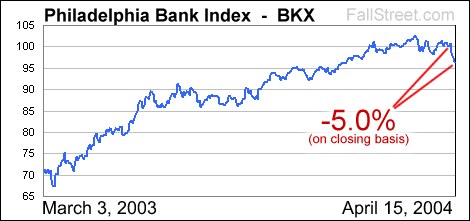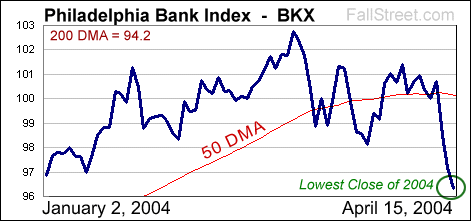April 16, 2004
As Interest Rate Party Threatens To End, Isolated Stock Crashes Begin
On April 2 a stronger than expected payrolls number set the wheels in motion: the Fed, which was supposedly waiting only an improving labor market, will soon start roll interest rates higher. It goes without saying that investor’s are especially scared of a possible rate hike today. Why? Because the US economy has been coddled with lower interest rates since 2001, and investor’s have not had to think about a Fed rate hike for almost 4-years (the last time the Fed raised interest rates was on May 16, 2004). In short, rising interest rates, at minimum, correlate to an increase in uncertainty.
 |
Despite the upswing in market volatility due to rekindled rate fears, the major US stock markets have barely budged since April 1. To be sure, as of yesterday the Nasdaq is down by 12.8 points since April 1, the S&P 500 is off by only 3.33 points, and the Dow is actually up by 24 points since April 1. To the unsuspecting eye, this sideways action simply means that the spike in US interest rates is not that worrisome – that the US economic recovery can be sustained even as interest rates push higher.
Incidentally, the theory that higher interest rates will not hurt the US recovery is easy to accept. After all, energy prices – which have surged in 2004 - are not as much of a drag on the economy as they once were. Remember also, a recent flare up in terrorism fear failed to spook the US consumer, and - thanks to seemingly insatiable foreign demand for US securities – government deficits no longer matter(?) With these things in mind, why can’t the US economy simply take higher interest rates in stride?
At the risk of being repetitious, the reason why any jump in interest rates could derail the recovery is because despite headline improvements in GDP the underbelly of the US economy has rarely been weaker. To be sure, during the so called ‘recession’ and ‘greatest bear market since the great depression’ consumers kept spending and borrowing, real estate prices never once relented, and very few investors left stocks. With this in mind, the conclusion that the resiliency of the US economy/equity markets has been remarkable fails to astonish: this ‘resiliency’ may prove to be only a temporary phenomenon
Inflation Fears Hits Certain Stocks Harder Than Others
No one collection of stocks highlights the isolated carnage going on in the equity markets today better than Real Estate Investment Trusts. Notwithstanding yesterday’s rebound in the group, REITs have been pummeled since April 2. The chart below – starting when the rally started in March 2003 - says it all:
 |
Along with REITs other interest rate sensitive stocks have also recently come under pressure. Specifically, financial stocks.
 |
While not hit as hard as REITs, financial stocks are nonetheless threatening to reach what many investors consider technically important trading levels (the 200 DMA). As prices hit yearly lows (yesterday), the financial stocks are certainly worth monitoring.
 |
Potential investment opportunities come and go quickly
Following the flurry of strong economic reports many stocks have declined to nearly attractive share prices. In the near-term, companies such as Northwest Natural Gas, National Fuel and Gas, and TC Pipeline are worth monitoring for potential long-term positions. Incidentally, and despite closing at $32.79 yesterday, TCLP temporarily traded below $30 per unit yesterday.
 |
With the TCLP example in mind, the lesson for the investor is to be ready for capitulation type selling pressures. Opportunities come quickly when scared shareholders want to sell at any price.
Conclusion
With certain stocks falling harder and faster than would seem to make sense (a less than 1% jump in the 10-year T doesn’t tell us why some interest rate sensitive companies have fallen by 10+%), the speculation is that investor’s previously pushed prices to unsustainable heights. To be sure, a strong economy that is producing more jobs should not equate to stock crashes – the reason why certain stocks are crashing is because no one was worried about selling so long as interest rates remained low.
The interest rate party has lasted a long-time, and the investor must have a great deal of patience when trying to buy companies at attractive share prices. Quite frankly, on